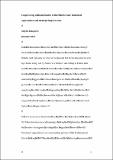Files in this item
Auxiliaries at war in the Middle East
Item metadata
| dc.contributor.author | Scheipers, Sibylle | |
| dc.date.accessioned | 2017-03-28T09:30:13Z | |
| dc.date.available | 2017-03-28T09:30:13Z | |
| dc.date.issued | 2015-07-22 | |
| dc.identifier | 249429382 | |
| dc.identifier | 365ae6df-fa3d-4b1e-8eea-36f9611cb130 | |
| dc.identifier | 84938240070 | |
| dc.identifier | 000359734600007 | |
| dc.identifier.citation | Scheipers , S 2015 , ' Auxiliaries at war in the Middle East ' , Survival , vol. 57 , no. 4 , pp. 121-138 . https://doi.org/10.1080/00396338.2015.1068569 | en |
| dc.identifier.issn | 0039-6338 | |
| dc.identifier.other | ORCID: /0000-0001-8080-3337/work/76386907 | |
| dc.identifier.uri | https://hdl.handle.net/10023/10540 | |
| dc.description.abstract | If the West wants to contain or rout the Islamic State of Iraq and al-Sham, it will have to rely on local allies in some way. The history of modern war suggests three ways in which such cooperation has previously been problematic. | |
| dc.format.extent | 555179 | |
| dc.language.iso | eng | |
| dc.relation.ispartof | Survival | en |
| dc.subject | JZ International relations | en |
| dc.subject | D839 Post-war History, 1945 on | en |
| dc.subject.lcc | JZ | en |
| dc.subject.lcc | D839 | en |
| dc.title | Auxiliaries at war in the Middle East | en |
| dc.type | Journal article | en |
| dc.contributor.institution | University of St Andrews. School of International Relations | en |
| dc.identifier.doi | https://doi.org/10.1080/00396338.2015.1068569 | |
| dc.description.status | Non peer reviewed | en |
This item appears in the following Collection(s)
Items in the St Andrews Research Repository are protected by copyright, with all rights reserved, unless otherwise indicated.

